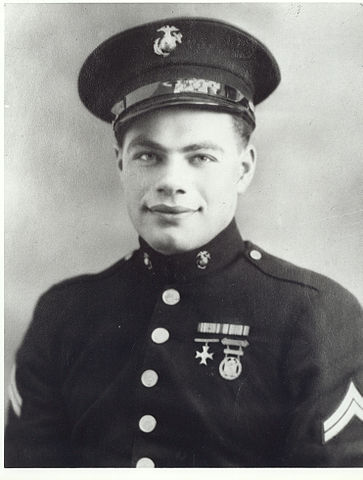Anthony Peter Damato was born on March 22, 1922 in Shenandoah, Pennsylvania. After the Japanese attacked Pearl Harbor on December 7, 1941, Damato volunteered for enlistment with the United States Marine Corps just weeks later on January 8, 1942.
After completing his initial recruit training, he volunteered to join a Marine unit being attached to United States Army forces for their amphibious assault on North Africa, Operation TORCH. The Marines were deployed to assist their soldier comrades as to that time, the Army had no amphibious assault experience. After the successful landings in North Africa in early November 1942, Damato returned to the United States in March 1943 and was reassigned to a brand new unit: the 22nd Marine Regiment.
The 22nd Marines were attached to the V Amphibious Corps and sailed for their first combat in early 1944. They would first see action in the Gilbert and Marshall Islands Campaign, where they were the primary assault force at Eniwetok Atoll, February 17-23, 1944.
Eniwetok's Engebi Island was the first landing site at the atoll, and after several hours of bombardment, the Marines went ashore on February 18, 1944. Japanese defenses had been estimated to be light, but the Marines faced strong opposition. During the night of February 19-20, the Japanese defenders were all but defeated and some of the Marines were being redeployed for attacks elsewhere on the atoll.
One Japanese soldier took advantage of the thin lines the Marines were occupying, approached undetected, and threw a grenade into the fighting position Anthony Damato occupied with two other Marines. Damato recognized the threat, and when he realized there was no other course of action, he shielded his two comrades from the device's deadly effects.
From Medal of Honor Citations for World War II (A-F):
*DAMATO, ANTHONY PETER
Rank and organization: Corporal, U.S. Marine Corps.
Citation: For conspicuous gallantry and intrepidity at the risk of his life above and beyond the call of duty while serving with an assault company in action against enemy Japanese forces on Engebi Island, Eniwetok Atoll, Marshall Islands, on the night of 19-20 February 1944. Highly vulnerable to sudden attack by small, fanatical groups of Japanese still at large despite the efficient and determined efforts of our forces to clear the area, Cpl. Damato lay with 2 comrades in a large foxhole in his company's defense perimeter which had been dangerously thinned by the forced withdrawal of nearly half of the available men. When 1 of the enemy approached the foxhole undetected and threw in a hand grenade, Cpl. Damato desperately groped for it in the darkness. Realizing the imminent peril to all 3 and fully aware of the consequences of his act, he unhesitatingly flung himself on the grenade and, although instantly killed as his body absorbed the explosion, saved the lives of his 2 companions. Cpl. Damato's splendid initiative, fearless conduct and valiant sacrifice reflect great credit upon himself and the U.S. Naval Service. He gallantly gave his life for his comrades.
Damato's Medal of Honor was presented to his mother at a large gathering in Shenandoah on April 9, 1945. His mother was later the ship's sponsor for the USS Damato (DD-871), a Gearing-class destroyer that was commissioned in April 1946 and which served with the United States Navy until her decommissioning on September 30, 1980.
Mrs. Damato and her family also gave a second son, Neil, to the cause of liberty. Neil Damato was shot down and killed over Europe as a member of the United States Army Air Forces, forerunner of today's United States Air Force.
The 22nd Marines were later part of the 6th Marine Division. The regiment was deactivated in 1946 in the post-war drawdown of the Marines, and except for a brief reactivation in the late 1940s as a training and demonstration unit, has not been active since.
Anthony P. Damato was initially laid to rest in a temporary cemetery on Kiririan Island in the Marshalls. After the war ended, his remains were repatriated to and reburied in the National Memorial Cemetery of the Pacific, Honolulu, Hawaii where he lies today.
"[I]f we fail, then the whole world,…all that we have known and cared for…will sink into the abyss of a new Dark Age made more sinister, and perhaps more protracted, by the lights of perverted science. Let us therefore brace ourselves to our duties, and so bear ourselves that…men will still say, 'This was their finest hour.'”
Subscribe to:
Post Comments (Atom)



No comments:
Post a Comment
COMMENTS ARE CLOSED. NO ADDITIONAL COMMENTS WILL BE POSTED HERE. IF YOU WISH TO COMMENT, PLEASE GO TO THE NEW BLOG SITE – http://theirfinesthour.net – AND LEAVE YOUR FEEDBACK THERE!!!
Note: Only a member of this blog may post a comment.